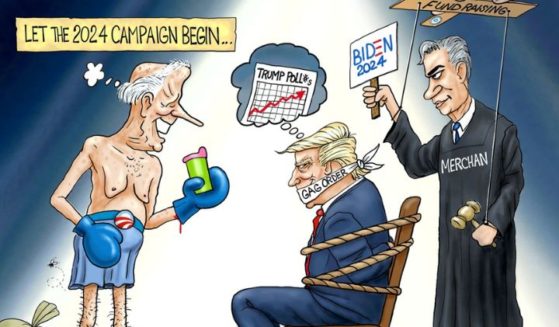GOP Lawmakers Object to New NAFTA Deal's Language After Noticing 'Deeply Concerning' Phrases Buried in Text
One of the promises that President Donald Trump campaigned on prior to his election was to dismantle and redo the flawed and lop-sided North American Free Trade Agreement, a vow that he is on the verge of fulfilling.
Trump and members of his administration have been hard at work negotiating a replacement to NAFTA with Mexico and Canada over the past two years, culminating in the announcement of the more balanced U.S.-Mexico-Canada-Agreement on Trade, which now awaits Congressional approval.
A stumbling block to that confirmation has been discovered deep within the language of the agreement by astute Republicans, language that could compel them to vote against the trade agreement, potentially in numbers large enough to scuttle the whole deal.
The Washington Examiner reported that at least 45 House Republicans have taken issue with language in the trade agreement that would seemingly bind the U.S. government and set precedent for the inclusion of “sexual orientation and gender identity” as a form of discrimination that must be protected against at the federal level.
That language is included in Article 23 of the USMCA trade deal, which mandates that all three nations must “implement policies that protect workers against employment discrimination on the basis of sex, including … sexual orientation (and) gender identity,” among other things.
The House Republicans notified Trump of how “deeply concerned” they were at the inclusion of the language in a letter written by Colorado Rep. Doug Lamborn, who suggested the inclusion of that particular mandate was “inappropriate and insulting to our national sovereignty.”
In Lamborn’s letter to Trump, the collective members of Congress applauded the president for his hard work at negotiating the deal, as well as his administration’s efforts to more narrowly define the terms “sex” and “gender” as having to do with an individual’s anatomy and biological makeup — not their imagined identities or preferences, as had occurred under the previous administration.
“As a sovereign nation, the United States has the right to decide when, whether and how to tackle issues of civil rights, protected classes and workplace rights,” Lamborn wrote.
He took issue with the inclusion of the sexual orientation and gender identity language in the trade agreement in light of the fact that it directly contradicted what the administration was working toward in that regard in other areas.
“A trade agreement is no place for the adoption of social policy,” wrote Lamborn. “It is especially inappropriate and insulting to our sovereignty to needlessly submit to social policies which the United States Congress has so far explicitly refused to accept.”
Lamborn also claimed that if the trade deal was approved by Congress with the objectionable language included, it would essentially codify as law two Obama-era executive orders which had included sexual orientation and gender identity in federal non-discrimination policies, executive orders which had been staunchly opposed by Congress.
Subsequently, any future efforts to undo those executive orders or otherwise drop sexual orientation and gender identity as a protected class would place the U.S. in violation of the new trade agreement.
“The inclusion of (sexual orientation and gender identity) as part of the definition of ‘sex’ in a trade agreement or elevation of (sexual orientation and gender identity) to the level of sex will cause unnecessary confusion in future international treaties as well as domestic law and policies,” wrote Lamborn. “It sets a dangerous precedent for courts and future Administrations to build upon.”
Lamborn said he and his Republican colleagues “strongly urge” the president to remove the offending language from the agreement prior to signing it as expected at a summit in Buenos Aires on Nov. 30.
In a separate statement about the letter, Lamborn said, “My concern is the precedent this could set for activist courts to cite as Congressional support for (sexual orientation and gender identity) language once the USMCA is adopted. I strongly urge (the president) to remove the troubling language in the deal that was adopted behind the scenes.”
Far too often, far too few actually read all of the language included in massive pieces of legislation or major international agreements. If that had occurred with this particular trade agreement, the “troubling language” could have essentially been codified into law without anyone’s knowledge.
Thankfully, a handful of Republicans took the time to not only read the entirety of the trade deal, but also realize the implications of the inclusion of language that may seem like no big deal at first glance, but could create some serious ramifications done the road.
Truth and Accuracy
We are committed to truth and accuracy in all of our journalism. Read our editorial standards.












